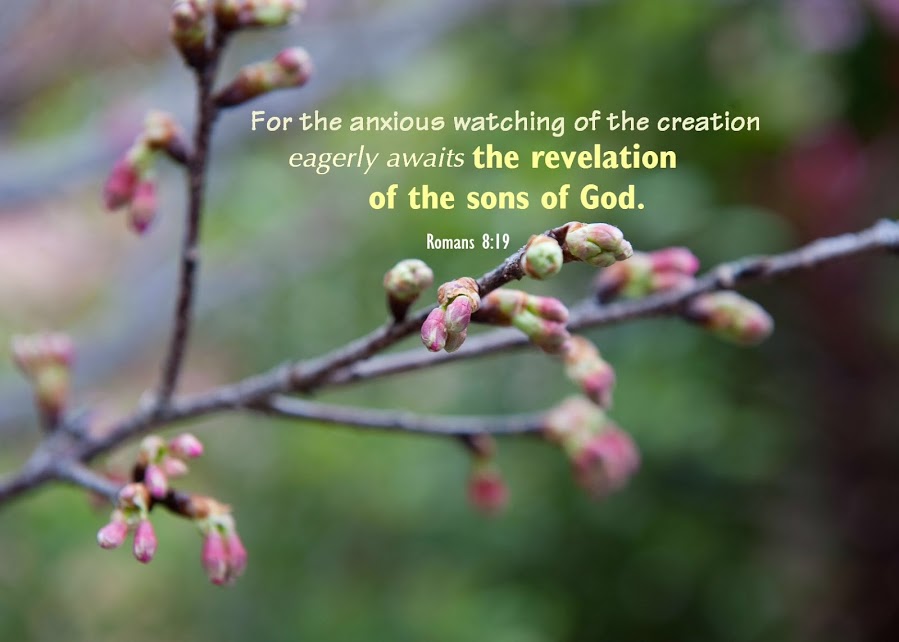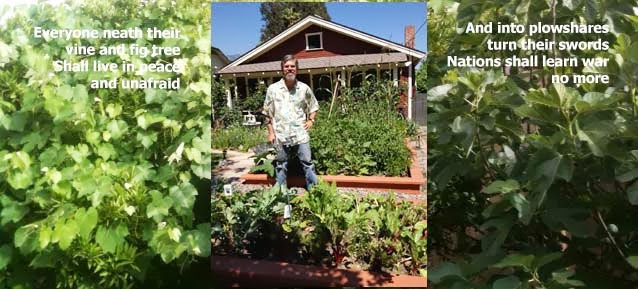 "All creation is anxiously waiting for the uncovering/the revealing of the children of God." (Romans 8: 18).
"All creation is anxiously waiting for the uncovering/the revealing of the children of God." (Romans 8: 18).
This biblical passage seems very appropriate as the theme of the global gathering of Quakers in Peru during the last two weeks of January. What makes this passage especially relevant is that Paul sees the redemption of Christ as cosmic, not just personal. Paul tells us that the whole creation is in bondage because of human sin and is yearning to be free. Christ came to liberate not just humans, but plants, animals, trees, every living creature. What wonderful news!
In this chapter Paul is describing a cosmic war between Spirit and flesh that begins inwardly--flesh yearning to satisfy its own selfish desires, and Spirit seeking to do God's will and to bring God's blessed community/kingdom down to earth.
What does that mean today? I am aware that many read this passage as if Paul is saying that Christ came simply to liberate us from death and prepare us for eternity in heaven. This is, I believe, a valid interpretation. Jesus did come to free us from our sins and prepare us for everlasting life. He let himself be crucified to show the liberating power of self-sacrificial love. His humiliating death was not the end, but the beginning of the Jesus movement. No longer would animals be sacrificed to appease an angry God; the death and resurrection of Jesus demonstrated that God is love, and made such sacrifices unnecessary. Through his ultimate act of love Jesus transformed the hearts of his disciples, freed them from sin, and ushered in a new age.
This is a valid, but I feel incomplete reading of the text. Paul isn't talking just about human beings. He is talking about all creation being redeemed. Let me give what I think it a more comprehensive reading of this text.
Paul's assertion that the "wages of sin is death" applies not only on a personal, but also on global level. We see clearly that human sin (alienation from God and God's purpose) is destroying the earth and threatening all life. Scripture teaches us that all creation is sacred and belongs to God ("The earth is the Lord's, and the profits therefrom," Psalm 24:1), yet we treat the earth as a possession, a commodity to be exploited for our own personal gain. The commodification of God's creation is sin, specifically, the sin of greed. And our insatiable desire for more and more material things is dooming countless species (including own own) to extinction.
That's why it is important to realize that Christ came to liberate all creation from this un-Godly way of life. To understand this passage, I'd like to reflect on three themes:
- The yearning of creation
- The uncovering of God's children
- Becoming children of God
The yearning of Creation
Paul presents God's Creation as a living entity with a desire for liberation. He compares nature to a woman in labor, about to give birth to a new being, a divine reality. This view of nature as a living creature with emotions and a divine purpose is in stark contrast to the modern view that sees nature as a mechanism or as a resource to be exploited for human purposes.
Paul's vitalistic and spiritual view of nature is in keeping with the philosophy/theology of the Quaker theologian Howard Brinton. Brinton drew a distinction between the mechanistic view of nature/religion/God (associated with Cartesian dualism) and the organic view of nature/religion/God espoused by Quakers. According to Brinton, Quakers understood not only biblically but experientially that we are all interconnected. As John's Gospel puts it, God/Christ is the vine and we are the branches.
Paul's view corresponds to my own experience of the natural world. I feel fully alive when I am in a natural environment--walking in the mountains, tending my garden, smelling the flowers and the earth. When I am in the natural world, I feel a deep connection with living creatures and I know we all come from the same Source. We all have similar yearnings to be free.
When I see the damage caused by fracking, mining, and clear cutting, or animals pent up to be slaughtered, my heart breaks for my fellow creatures in the natural world. It is heart-rending to see how our Mother Earth, God's special Creation, is being polluted and destroyed for the sake of human greed.
I feel as if the Earth is crying out, asking for us to listen to what we know in our hearts is the right thing to do. We need to live in harmony with Creation. We need to live sustainably. God gave us a mind and heart that enables us to live in a way that brings peace and joy to the world.
I am glad that over 40 Quaker organizations around the world have endorsed a statement called "The Challenge of Climate Change." But we need to move beyond mere words and engage in meaningful, prophetic action. We need to become changed people so we can change others. My wife and I have taken steps to reduce our carbon footprint and water use. We have reduced our water use by 50% by installing a gray water system and our electricity use by 100% by installing solar panels. We drive a Chevy Volt that gets 80 miles per gallon. We harvest fruits and vegetables from our garden. We share our abundance with friends and neighbors. We also use our home as a model of green living so others can follow our example.
But this is just the beginning. We need deep changes in policy. We need to change our system so it rewards good stewardship instead of greed and waste. We need to do our part to fulfill the divine plan to bring God's kingdom down to earth. I believe this is the work that God is calling us to do in our age.
Uncovering our true nature: the "apocalypse" of God's children
How do we become "children of God" and part of God's liberation movement? I believe we already are children of God, created in God's image. Each of us can connect directly with God through the Inward Light (Logos), but many of us don't know it or don't act as if this were true. We have assumed other identities that alienate us from our true identity. For example, we imagine that we are first and foremost Americans or Russians or Israelis. This nationalistic identity sometimes stands in the way of our realizing that we are part of a human family and that everyone in that family is equally important. This human family was created by God, for God's purpose of creating God's blessed community here on earth as it is in heaven. We need to realize this basic truth in order to become fully human. Furthermore, as Paul implies, we are part of a family that includes all living creatures. We need to uncover our true nature as children of God to realize this truth about our relationship to creation.
Paul uses the word "apocalysis" (uncovering) in this passage, which implies that we are uncovering what already exists within in. This essence is what Quakers called "the Seed." Within each of us the "Seed" is yearning to grow and bear fruit in acts of kindness and love.
I know from experience what it means to be a child of God. In meeting for worship, I experience my interconnection with everyone in Meeting. I feel I can let go of my personal agendas, personal thoughts, and listen to what Spirit is saying to me and to each of us present. In the deep silence I feel a deep connection with those around me, a sense of peace. Not the peace of the world, but the peace that passes understanding.
Sometimes I don't feel peace, however, I feel inner conflict when my life is not in harmony with God's will. I feel uncomfortable. My thoughts are scattered. I can't focus. So I wait until I feel God's presence and wisdom guiding me either just to "be still and know that I am God" or to take action to bring back my life into harmony with God's desires. I reflect daily on the passage: "Lord, you will keep in perfect peace those whose minds are fixed on you. For in returning and rest will be our salvation. In quietness and trust will be our strength (Isaiah 26:3; 30:15)." Returning one's attention to God can a long and painful process. but it is also necessary for us to grow emotionally and spiritually.
In this process, I feel that I am being more and more aware of how I am part of the human family that God created for God's purpose. I am not an isolated individual. I am part of this Creation that is anxiously yearning to be free.
I look forward to connecting with Friends from around the world--from Africa, Asia, Europe, the Middle East and Latin America. We are all part of the Quaker family, but more importantly, we are part of God's family. I am really excited to explore how we manifest our true identity as children of God!




